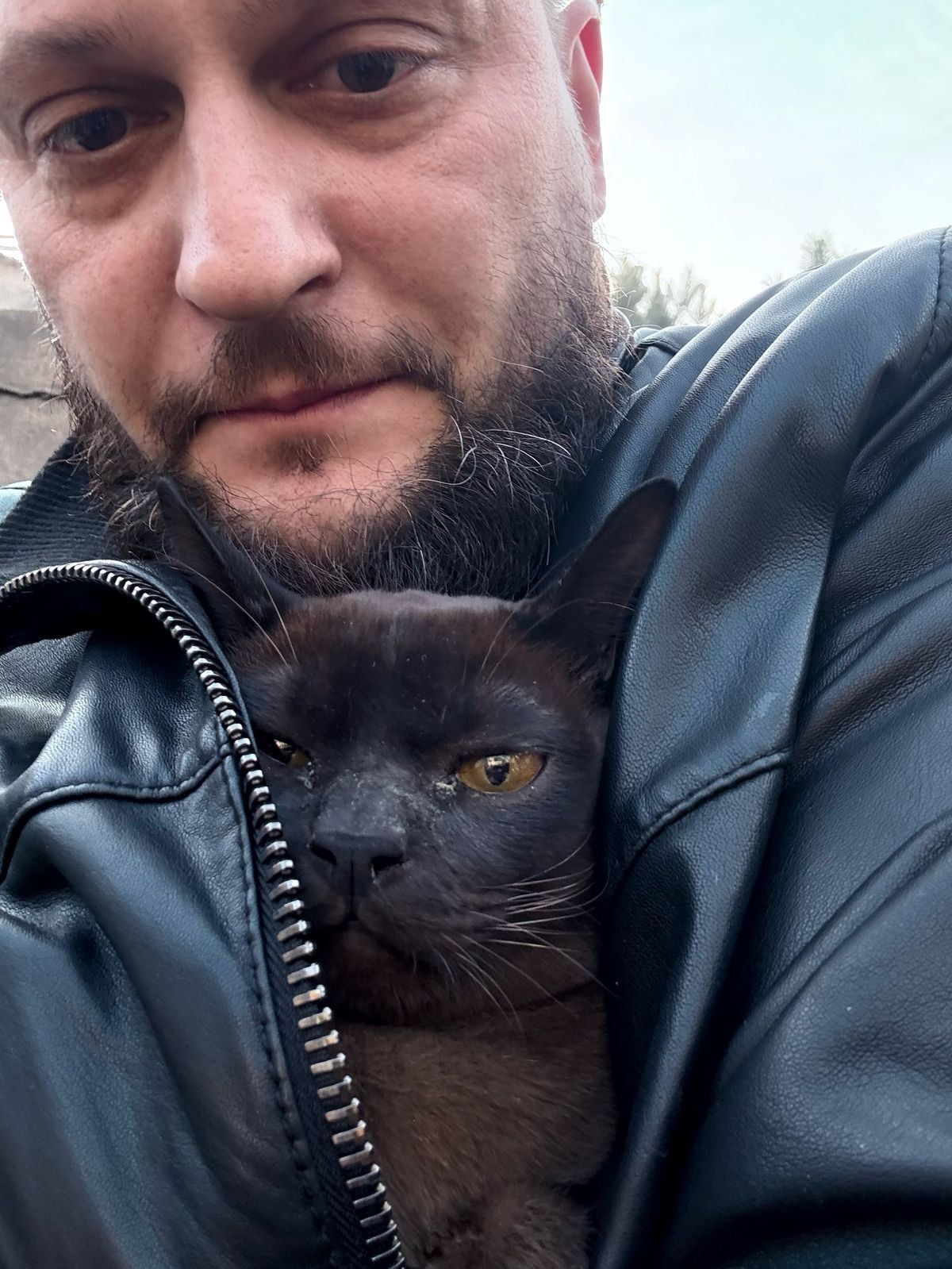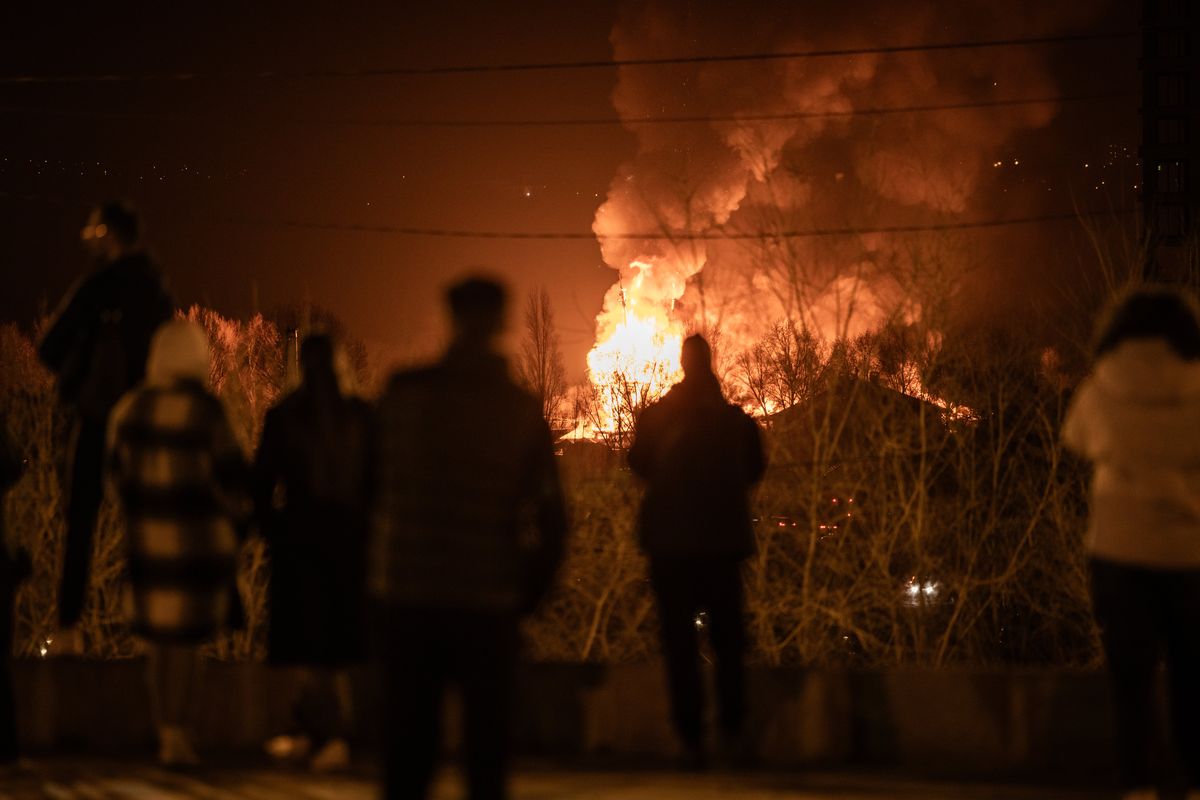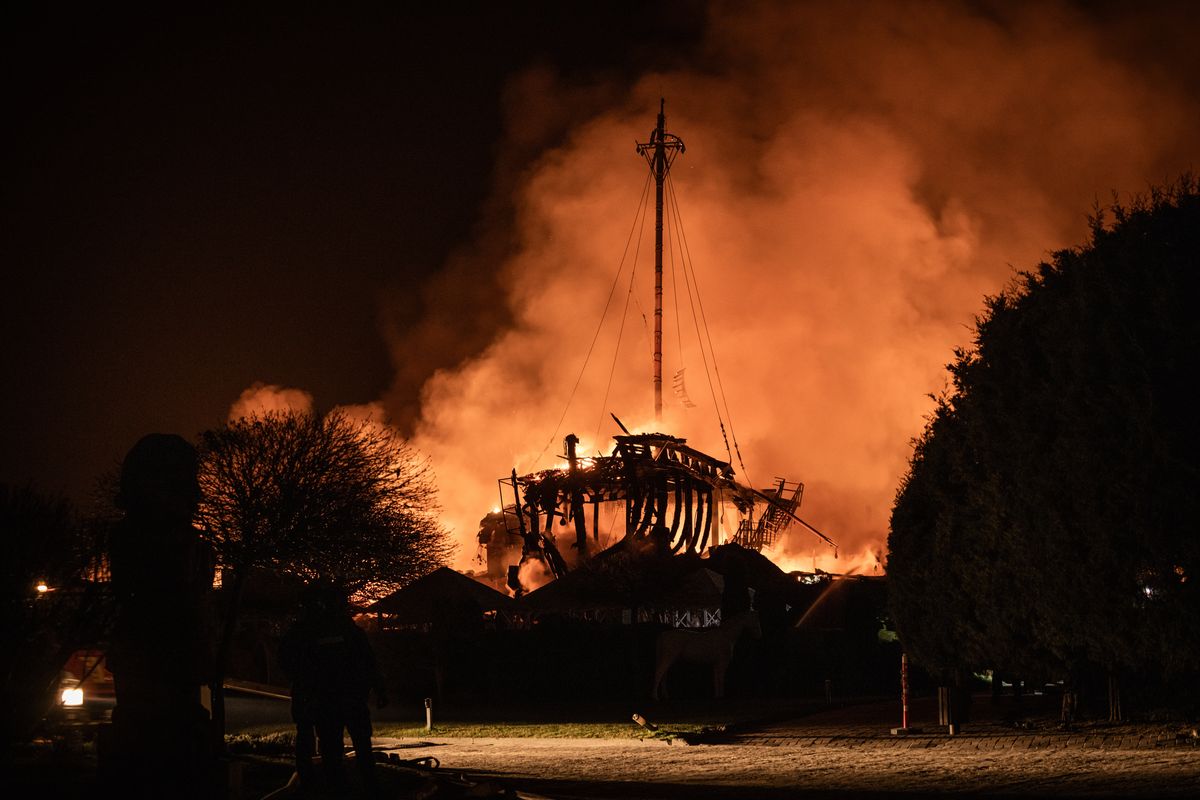Deadly Russian attacks leave Ukrainians questioning point of ceasefire
People watch as a riverfront restaurant in Dnipro burns after a Russian drone attack Saturday. (Ed Ram/For The Washington Post)
DNIPRO, Ukraine – Soon after Russia launched a massive, deadly drone attack on his city Friday night, killing four people and injuring more than 20 others, Hennady Lytvynov, 60, stood outside watching his street burn – and wondering how this war could ever end.
“This is the result of peace negotiations with Putin,” he said, gesturing to what was left of his neighbor’s house, struck by one of the drones. “He’s not going to do anything. He’s going to continue killing civilians.
“Trump promised the war would end in one day, and everyone was waiting for it. He believed that Putin is a friend of his, but he’s an enemy. He’s an enemy of America, of Europe and definitely of Ukraine.”
The Ukrainian air force said Russia launched 172 drones at Ukraine overnight, including more than 20 at the eastern city of Dnipro. Most were shot down, but one struck a popular hotel restaurant beside the river that runs through the city. Explosions shook Dnipro throughout the late evening, and the restaurant, which was made of wood and shaped like a boat, erupted into a massive blaze.
In other parts of the city, drones or debris hit houses and an apartment building. A pregnant woman was among those wounded, officials said. Russian drones also struck the eastern cities of Sumy and Kharkiv. On Saturday, a missile hit President Volodymyr Zelenskyy’s hometown, Kryvyi Rih, wounding several people.
The mass attacks came just days after Russia and Ukraine each agreed with the United States on a 30-day cessation in attacks on energy infrastructure. Ukraine had originally agreed to a total ceasefire in the air and at sea, but Russia did not reciprocate. Dnipro residents reeling from Friday’s strikes said it was clear that any arrangement to stop attacks on energy infrastructure had in no way dissuaded Russian President Vladimir Putin from ordering strikes on other targets, including civilian gathering places such as restaurants, hotels and homes.
There has been major confusion in Ukraine over the terms of the agreement, with Russia backdating the deal to March 18 and suggesting that Washington should lift sanctions in exchange, a term that was not approved by Ukraine and would be seen as unacceptable. Russia also said that violations of the deal would nullify it.
Both countries have accused each other of breaking the ceasefire.
Russia has said that Ukraine had “virtually destroyed” a gas metering station in the western Russian town of Sudzha, which Ukraine controlled until a recent Russian counteroffensive. Ukraine has denied responsibility for any such attack.
In his daily remarks on Friday, which were published before the drone attack on Dnipro, Zelenskyy said that he had instructed Defense Minister Rustem Umerov “to present to our American partners all the facts regarding damage to our energy infrastructure caused by Russian attacks.”
In the past day, Zelenskyy said, Russia had struck gas infrastructure in Ukraine’s Poltava region and damaged power infrastructure in the southern city of Kherson. Another Russian attack in the northeastern city of Kharkiv damaged equipment for the city’s heating supply, he said.
“All of this shows that Russia will continue to sabotage diplomacy and will continue to act in this way, and that Moscow’s only tactic remains dragging out the war,” Zelenskyy said. “Putin may say things that sound like he agrees with the American side, but in reality, the Russian army just keeps pushing forward with all available military means.”
Zelenskyy has walked a careful line in recent weeks: trying to caution against trusting that Putin will abide by any ceasefire without irritating Washington, which is plowing ahead with President Donald Trump’s goal of ending the war quickly. Many Ukrainians were furious with Trump after he berated Zelenskyy in the Oval Office and then cut the provision of U.S. military assistance and intelligence sharing. Both have since been restored.
In a residential building next to the restaurant, a Washington Post reporter asked an employee at the concierge desk who had just survived the strike if he had any message for Trump. The man cursed Trump with a profane Ukrainian expression. He said he once liked and believed in the American president. “My view of him has completely changed,” he said.
Across town, Stas Smirnov, 41, stood and watched the house where he had lived for decades burn down. He had stepped outside to buy cigarettes at a gas station just minutes before a Russian drone crashed into his residence – a random decision that likely saved his life. His young daughter was on vacation in Spain.
But Vitalii, the security guard he had hired to monitor the house, had been killed in the attack. Smirnov would do everything he could to help his family, he said. He still couldn’t believe Vitalii was gone.
Meanwhile, Irina Presnikova, 44, was pacing around the block to try to calm down. A neighbor of Smirnov’s, she had been at home, less than 10 feet from the impact site. She was shaken but otherwise all right. “I heard there was going to be a ceasefire for a month,” she said. “We had the opposite experience. They’re shooting even more now.”
Firefighters ran back and forth to their truck, hauling hoses from side to side. They urged Smirnov to move a car out of his garage before it, too, caught fire.
He parked it down the road, then got out to keep watching as his family history went up in flames. So much was already gone: his house, Vitalii, any sense of safety.
All he could think about now was Guinness – his 5-month-old kitten, named for his deep brown-and-black coat. He had been home when the strike hit, but the fire was still raging and there was no way to try to find him now. Smirnov said he had little hope the kitten had survived – but would not leave until firefighters would at least let him inside to look.
By morning, he was allowed to begin his search. He combed through the remains of his home, checking the smoky, ash-covered basement three times with no luck.
Then he checked again. And there was Guinness, covered in soot, huddled under a couch. Smirnov didn’t know if he’d been there the whole time, not visible through the smoke, or if he had found his way there later. He didn’t care. He scooped Guinness into his arms, tucked him against his chest and zipped him into his leather jacket to stay warm. Then he dropped him off at his mother’s house to recover.
He’d lost almost everything. But not everything, after all.
“I don’t care about my building, my house, because it’s 25 years old,” he said. “It brought me a lot of happiness, but maybe this is the end of its story. I should write another one.”





